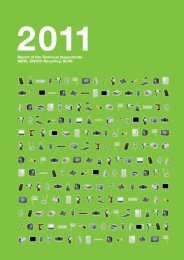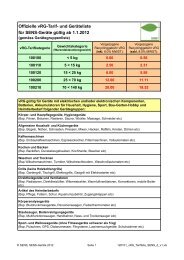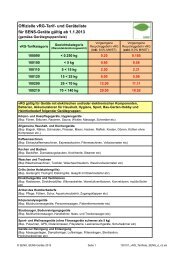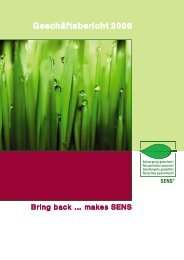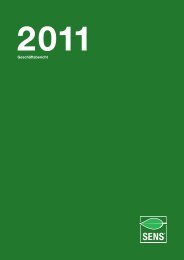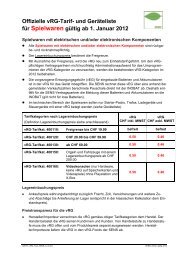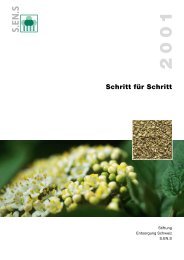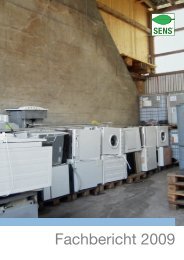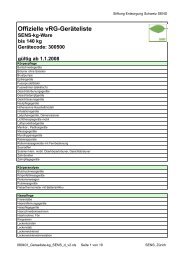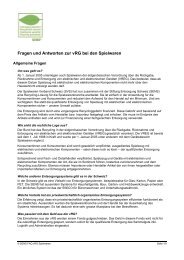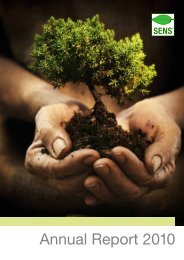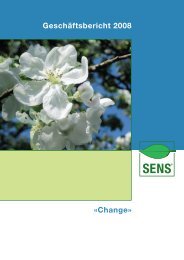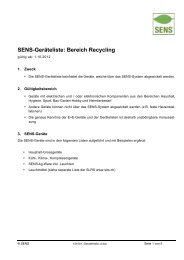Annual Report - Sens
Annual Report - Sens
Annual Report - Sens
You also want an ePaper? Increase the reach of your titles
YUMPU automatically turns print PDFs into web optimized ePapers that Google loves.
systematically, by prescribing not so much the means to<br />
achieving the ends as the ends themselves.<br />
“The existing statutory instruments are<br />
directed at resource efficiency only in part.<br />
This should be changed systematically.”<br />
However, the state has other options, which it has not made<br />
enough use of so far. Education and innovation can make<br />
crucial contributions to solving the problem of resources.<br />
Whereas some highly successful educational opportunities in<br />
this area have already been created at the level of Universities<br />
of Applied Sciences, we are still waiting in vain for a focused<br />
research and development programme from the state itself.<br />
“Education and innovation can make<br />
crucial contributions to solving the problem<br />
of resources.”<br />
But companies can still improve their management of resources<br />
to their own advantage, without the state having to intervene.<br />
Very few businesses have accounting systems that enable<br />
them to allocate resource and environmental costs directly to<br />
the individual products incurring them. These costs are usually<br />
allocated to overheads, with the result that ‘resource-friendly’<br />
products indirectly subsidise ‘resource-hostile’ products,<br />
which then become cheaper. This encourages poor investment<br />
decisions, with the incorrect allocation of costs producing a<br />
situation where the savings potential of behaviour that con -<br />
serves resources is underestimated.<br />
What do you personally do in your daily life<br />
to conserve resources?<br />
I try not to do too many things at once and concentrate my<br />
options on a few, efficient measures. Two years ago we had<br />
our house totally renovated along energy-efficient lines and<br />
are now about to replace our oil-fired heating system. As far as<br />
food is concerned, I am mindful of where foods come from, and<br />
I don’t eat a lot of meat. Other ways of conserving resources<br />
Interview<br />
Thomas Heim<br />
Dr. sc. nat. (Doctor of Natural Science) ETH (Swiss Federal Institute of<br />
Technology in Zurich), Director of the Centre for Resource Efficiency (ZEF)<br />
of the Fachhochschule Nordwestschweiz (FHNW) (University of Applied<br />
Sciences and Arts Northwestern Switzerland). Managing Director of the<br />
Effizienzagentur Schweiz (Swiss Agency for Efficiency). Expert in environmental<br />
and resource efficiency, cleaner production and clean technology.<br />
without foregoing any comforts are recycling, composting and<br />
not printing out texts. It’s much more difficult when it comes<br />
to mobility: travel is without doubt my environmental weakness<br />
– I do get a season ticket for this though.<br />
Swiss Agency for Efficiency<br />
The Swiss Agency for Efficiency is an internationally operating planning<br />
and consultancy company. A spin-off of the University of Applied<br />
Sciences and Arts Northwestern Switzerland, it offers sustainable solutions<br />
for enhancing the efficiency of companies and institutions, by<br />
reducing their energy consumption and optimising the flow of materials,<br />
processes and products.<br />
SENS <strong>Annual</strong> <strong>Report</strong> 2011 15



